Living at the beach supposed to be amazing, a treat, a life goal. Basically, it’s everyone's dream, but what if I told you that the dream is broken? I know you’ll think I am crazy. How can I put the word sad and the word beach in the same sentence, right?
All over the world, visiting beaches is a common summer experience and every country has a popular holiday season. Europeans go to the beach between May and September and they go to exotic countries around Christmas. Israelis travel in October, Thais in April. With the exception of some locations with seasonal openings, the best beaches are always crowded, 365 days per year. The world loves going to the beach.
A holiday at the beach with your family after a year of hard work is, perhaps, the best reward. Kids ask their parents, "when will we go to the beach?" You, and perhaps your partner dream of that fresh, tasty coconut while soaking in a hotel jacuzzi.
Even if you are a backpacker and you have been traveling for a while on the mainland you know you will hit the ocean at one point.
Life at the beach is amazing, isn't it? Picture yourselves on a tropical Island: wake up late, get out of your bungalow, look at the palm trees, listen to the sound of the birds and waves, run on the white sand and jump into the crystal clear water. I agree that a holiday at the beach is freaking amazing. However, living on the beach is a completely different experience.
This topic is quite challenging and it can be difficult not to sound like a cliche. I’m not a reporter I am only an umpteenth witness to the problem. Do you have an idea about how much rubbish comes from the sea? Hotel staff cleans up the seafronts of your favorite beaches every day. They start early in the morning before the tourists wake up so no one realizes the magnitude of the problem. The beach always looks stunning to guests. I always knew this was an issue. Who doesn’t? The issue of climate change and pollution has been widely reported. I was aware of it but I couldn’t picture how bad the situation was until I moved to a beach. It doesn’t really matter where I am writing from, my location doesn’t matter. This is a worldwide disaster. Sadly, it’s happening everywhere.
When I talk about rubbish I'm not just referring to some bottles or plastic bags that wash up. The water is, literally, full of shit. Shoes, glasses, fishing ropes, buckets, flip flops, toothbrushes, cans, sanitary pads and so on. All kinds of human waste get to the seaside, especially after a storm. Some friends who came to visit me said they don’t buy beach toys for their son anymore because they know they’ll find discarded toys on the beach. After 30 minutes of exploration on the reefs, they came back with a plastic bucket, a little shovel, a ball, a marble and a plastic rake. What a treasure ... WTF!!
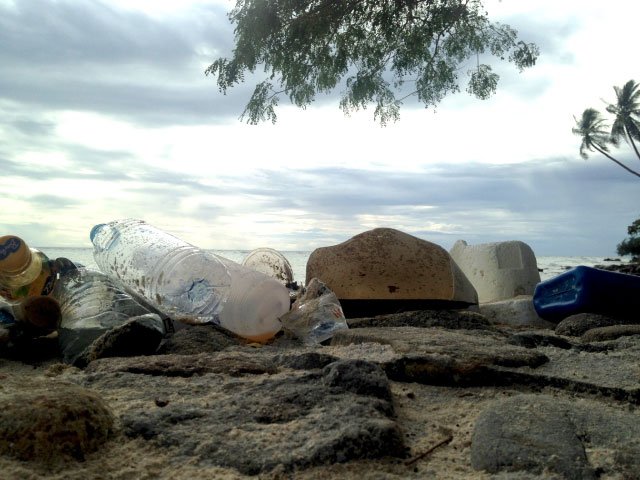
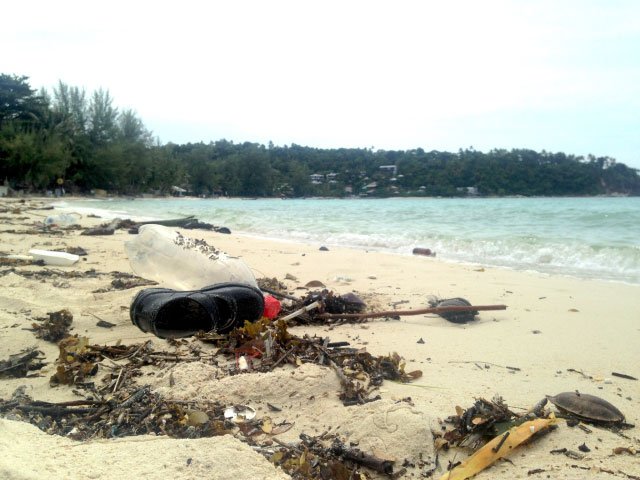
I personally dragged an armchair out of the water. How is this possible? Who can fucking dump that into the water? What is wrong with people? While writing this, I thought about the images of the floating plastic island that was recently found by Caroline Power in the Caribbean. My pictures are nothing close to what she saw and experienced, but in the end, the problem is exactly the same. If the human race will not drastically cut the production of plastic and learn how to recycle properly, sooner or later we will not be able to enjoy the beach, to eat fish or seafood, to dive, to go to a marine park or even be able to touch the water. This dystopian vision is likely as we’ve almost reached the point of no return.
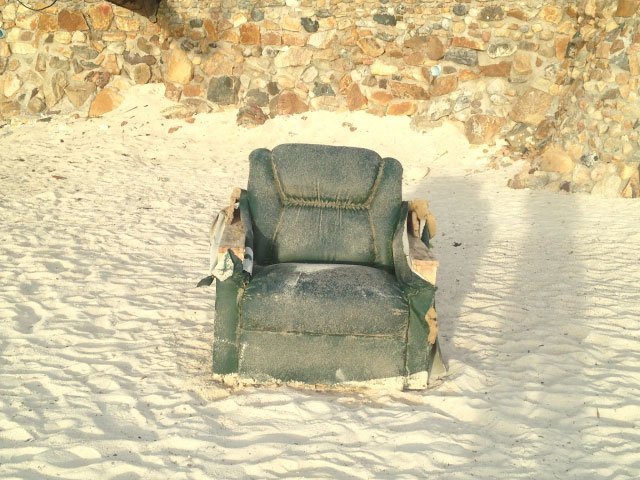
In the past few years, I have traveled the world and seen a big difference in how countries handle their rubbish. In the clean and organized Germany, you can put your plastic and glass bottles into a dispenser and get paid for recycling it. In Cambodia, one of the poorest countries in the world, rubbish is everywhere. In Japan, there are no rubbish bins on the streets but everything is extremely clean because Japanese people always carry their trash home. In some Japanese cities, there are 44 different recycling categories.
I’ve had the privilege to spend time with amazing cultures like the aboriginals in Australia and the Karen hill tribe in Thailand. Both of those communities have almost lost the capability of surviving in nature, they buy and eat western processed food and outside of their huts trash is everywhere. Recently, I worked with some Burmese people who’ve come from one of the world’s most repressive and abusive regimes. They have no understanding of hygiene or recycling. Travelling and sharing my life with different ethnicities has taught me a lot about this topic. I realized that many minority groups don’t know anything about the environment because no one is teaching them. The developed world has no interests in sharing this kind of knowledge. In fact, the third world countries on top of their own waste production have become the dumping grounds for developed countries. Much of the water pollution comes from those places where rubbish gets to landfills, then into rivers, then into the oceans. It is a vicious cycle and ridiculously, everything will come back to the sender.

Sihanoukville (province) Photo Credit: Red Shark Charters
I have also learned that many people from developed countries can be assoles. I really can’t stand those so-called civilized people that come to the beach on holiday and litter all over the place. Yes, the dirt at the beach isn’t coming just from the water. Many tourists don’t think to clean up their rubbish (Cigarettes, beer bottles, disposable cutlery, etc, etc) so when the tide changes their shit gets into the water. To me, that’s just unbelievable and disgusting. I was raised, I was educated by my parents to not litter, to bring my trash back home after an excursion especially if I was going somewhere without trash bins.
Chotika and I are always supporting each other, so of course, we teamed up for this cause. We often clean up our beach corner which is the same size of a 70 sqm apartment. We separate the woods and the seaweeds from the trash and just in that little space, we collected almost 1 full bag of rubbish every single day. Now, if I imagine the length of the whole beach, and the amount of waste we found in our small piece of paradise, and I multiply the trash we have collected, I have a crazy amount of rubbish bags in front of me. It is very upsetting.
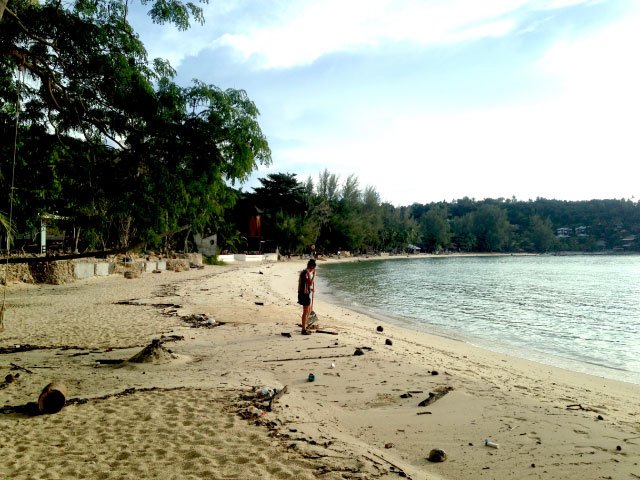
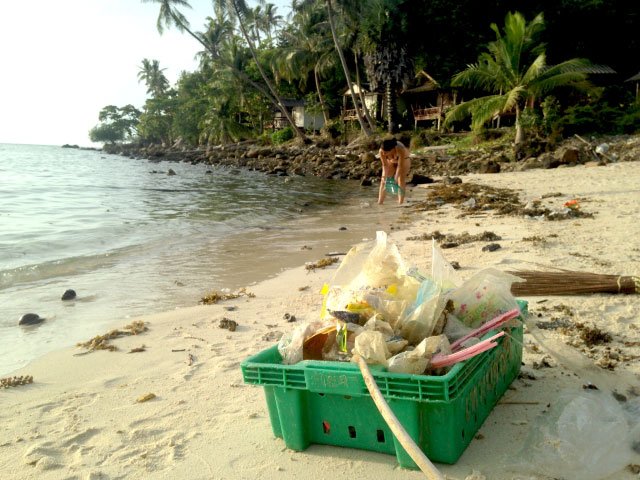
Fortunately, there are others like us but not enough. I met young parents bringing their kids there to do exactly what we did, they make me think that there is still hope for us to change our behaviors. We still have a chance to change, we could still try to clean up the ocean if everyone put some effort into this massive issue. We must change our mindset and start to use less plastic. We urge you to teach the young generations what they must do to repair the damage we have done to their future.
"44 different recycling categories." we still have a lot of progress to do !
"We must change our mindset " this not the easiest part !
yeah right? Japan is so adavnced!
Hi! I am a robot. I just upvoted you! I found similar content that readers might be interested in:
http://theout-sider.com/outsider/story/18
Yes, you found the same article on my website.
You have received an upvote from @livesustainably. I promote and curate content that encourages and educates others in living sustainably.
I also run competitions for those making the world a better place. Check out this weeks Don’t Buy It competition here
cool thanks!
Congratulations @theoutsider! You received a personal award!
Click here to view your Board
Congratulations @theoutsider! You received a personal award!
You can view your badges on your Steem Board and compare to others on the Steem Ranking
Do not miss the last post from @steemitboard:
Vote for @Steemitboard as a witness to get one more award and increased upvotes!